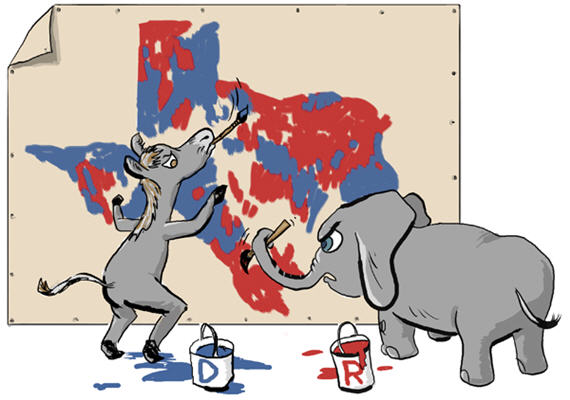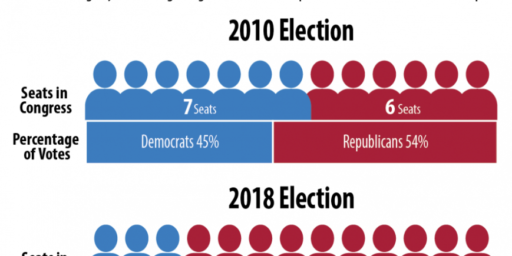Redistricting and Race
While Republicans will likely take over some key governorships and state legislature after November's midterms, America's changing demographics will limit their ability to gerrymander safe districts.
Dylan Loewe argues that Democrats should stop worrying about Republicans re-drawing Congressional districts because demographic changes make it harder.
Over the last ten years, 80 percent of the population growth in this country has come from minorities, overwhelmingly in metropolitan areas. When states like Texas are awarded new congressional districts (they are expected to get four this cycle), those districts will have to be drawn in the same metropolitan areas where such high minority population growth is occurring. Barack Obama won 80 percent of the minority vote. He won every major city in Texas except Fort Worth. This means that these new districts are going to be drawn in areas that are going to be highly populated with Democrats, ones that are almost certainly going to send Democrats to Congress. This, of course, will play out beyond Texas. In fact, of the 10 new districts expected to be allocated, there is reason to believe that at least 8 of them will end up in Democratic hands.
I don’t mean to understate the power of gerrymandering. But even gerrymandering can’t solve this problem for the Republican Party. In the middle of last decade, when Tom Delay and state Republican leaders redrew the Texas state map in a way that removed half a dozen Democratic seats, they didn’t touch the minority districts already in place. Why? Because they were concerned that doing so would invoke the Voting Rights Act and send the newly drawn map to the courts, where it would likely be redrawn by judges. (If that happened in 2011, Democrats could gain as many as 10 seats in Texas.) During the 2011 redistricting, it won’t just be the already existing minority districts that Republicans will have to avoid. It will be the new ones too. With the vast majority of the population growth coming from minorities, the vast majority of the new districts are likely to require minority representation. And for the first time since the Voting Rights Act was passed, the Attorney General in charge of overseeing the process will have been appointed by a Democratic president.
It’s worth noting that in addition to having some states gain seats, others, like Ohio and Michigan, are expected to lose seats. But even if taken to the extreme–even if Republicans are able to ensure, in each case, that a Democratic seat gets erased, that still won’t do as much for the Republican Party as they think. Such a district is likely to be erased in predominantly white, rural areas, where population has declined over the last decade. That means that the Democratic districts that will be erased are more likely to be moderate ones, the kinds that Blue Dogs represent.
But these disappearing districts are being replaced in parts of the country where population growth is high and minority-driven. That creates a surprisingly beneficial system for Democrats in which we replace a Blue Dog seat in Michigan with a progressive, minority-represented seat in Arizona. By the time redistricting is over, not only will Democrats have secured for themselves a far more favorable map, they will have also gone through a process that will unify their caucus, increasing the number of seats where progressives can win, in exchange for decreasing the number of seats where Blue Dogs can win.
It’s a one-two punch for Democrats, and a reason to be optimistic. Republicans can keep beating their redistricting drum. They can keep making the argument that they will once again wield the pen in their favor during redistricting. But, as is so often the case with Republicans, they are wrong, and are peddling nothing more than a myth.
Ruy Teixeira has made a pretty good living for the last decade projecting an emerging Democratic Party majority based on the fact that immigration and divergent birth rates will overwhelm the white voter base from which the GOP draws most of its support. We saw its effects in the 2008 presidential election, where once solid Red States North Carolina and Virginia voted for Obama. (Of course, demographic shifts weren’t the only factor. Indeed, Obama won Indiana, which remains 88% white and hadn’t voted Democrat in my lifetime.)
In the short term, the diminishing white population would seem to be both a boon to Democrats and fuel for the trend towards increased polarization. One of the things driving the Tea Party movement and other more radicalized elements of the conservative base is a sense that their culture is under siege. And that, more than concerns about the rule of law or competition for low wage jobs, is what’s animating the most energized opposition to illegal immigration.
In the longer term, the political science literature tells us that the Republican Party will adapt to the changing demographic realities and nullify the Democratic advantage. There’s no inherent reason, after all, that blacks and Hispanics have to vote Democrat. Indeed, there’s an argument to be made that both groups are better fits with the Christian conservative wing that dominates the GOP than the secularist wing that dominates the Democratic Party. Presumably, that will happen on the policy front at some point. Republicans would be foolish, indeed, to keep banging the “wall off the border” drum once catering to whites stops being enough to win elections. But it takes a long time to change voting patterns. Blacks were solid Republicans for decades after the Civil War but have been solid Democrats since the New Deal. That those who imposed and fought to the bitter end for Jim Crow were Democrats didn’t seem to matter, mostly because the Solid South was a one-party region. And the Dixiecrats eventually found a home in the GOP.
The bottom line is that the GOP will soon be a fringe party, unable to win national elections or move beyond rump status in Congress, unless it finds a way to broaden its appeal to non-white voters. And recent trends have them moving in the opposite direction, doubling down on appealing to the baser instincts of disaffected rural whites.







This has been a recurrent fantasy on the right, and it is interesting to speculate why anyone thinks it is even plausible.
What distinguishes the republican christian conservatives is not their religiosity, but rather their politicization of religion. One can sense in public discourse that the common definition of “secularism” seems to be drifting toward synonymy with “athiesm” – when what the word actually means, of course, is a reference to the worldly concerns rather than religious ones. A secular government is not an athiestic government, but rather a Jeffersonian one – one that occupies itself with the security and economic issues of the nation and leaves the religious realms alone, except to protect their existence. I sense this fudging of meaning in James’s comment, though maybe I misinterpret.
There is, and has been a strong moral dimension to the positions that find favor in the black community, and the church has been a vital organizing locus for the community, but there has never been much of any support for the attitudes of the Christian right – that government should be seen as a vehicle or a tool for enforcing a particular set of personal values with the force of law.
Similarly, although many in the Latino community are socially conservative in their personal lives, there has never been any organized support for political movements that seek to politicize moral values and impose them by force.
There seems to be, in James’s comment, an easy equation of what one’s personal values are and one’s political views. I dispute that. I think that there are plenty of people who live lives that any social conservative would find exemplary, but who are political liberals. They choose to live their lives by certain values, and demand the same right of freedom for their fellow citizens. Rather than demanding that their fellow citizens live the same way.
And of course, as well all know, there are plenty of libertines who spew political conservatism and want everyone else to live by values that they do not.
I absolutely agree with that. I just don’t think that the GOP will have success if it keeps telling itself that minorities are primed to become Republicans because they actually share Republican values.
There is, and has been a strong moral dimension to the positions that find favor in the black community, and the church has been a vital organizing locus for the community, but there has never been much of any support for the attitudes of the Christian right – that government should be seen as a vehicle or a tool for enforcing a particular set of personal values with the force of law.
Similarly, although many in the Latino community are socially conservative in their personal lives, there has never been any organized support for political movements that seek to politicize moral values and impose them by force.
Tano, how does the black and hispanic voting trend on Prop 8 a couple years ago fit into this theory?
Latinos voted 53% for prop 8 compared to whites at 49% for prop 8. Asians voted against prop 8 at the same rate as whites (51% against, 49% for). Blacks are really the only out-lier here (at 70% for prop 8) and social issues haven’t shown any indications of causing black defection to the GOP. Indeed blacks keep voting by enormous majorities for some of the most pro gay marriage reps out there, so I don’t think there’s anything democrats have to worry about.
If the GOP keeps talking about restoring America to its glorious past (a past when blacks had less rights and Latinos were in other countries), social issues may not be on the top of the list for many minorities when voting for congressional representation. If that changes, who knows?
http://www.cnn.com/ELECTION/2008/results/polls/#CAI01p1
Gerrymandering districts is much easier when you have areas of large % of like minded people of your opposition. Having liberal thinkers concentrated in the cities make it easier for the GOP. The idea of gerrymandering is to get more seats than you would otherwise. The tendency of where the population is going is a whole different subject.
One can argue as James seems to be that the Nation is turning more liberal but disagree with that. Most polls show the population is turning more conservative. Many of the second and third generation of immigrants tend to turn into conservatives. Kind of like the old saying “if you never was a Democrat before age 30, you don’t have a heart. If you are a Democrat after 30 you don’t have a brain.”
Anyway, thinking of this purely as people who are white therefore conservative and those who are not white therefore liberal is a bit racist.
” Most polls show the population is turning more conservative. Many of the second and third generation of immigrants tend to turn into conservatives. Kind of like the old saying “if you never was a Democrat before age 30, you don’t have a heart. If you are a Democrat after 30 you don’t have a brain.”
Despite the trotting out of the tired old cliche in fact most polls (ie. elections the ones that count) show the population is becoming more liberal. But you’re welcome to nurse your illusions that liberals are becoming ghettoized in big cities whe in fact it’s Republicans who are becoming fearfully concentrated (well fearfully for them) amongst the aged, the rural and the southern.
Re “Despite the trotting out of the tired old cliche in fact most polls (ie. elections the ones that count) show the population is becoming more liberal”
We will see in November.